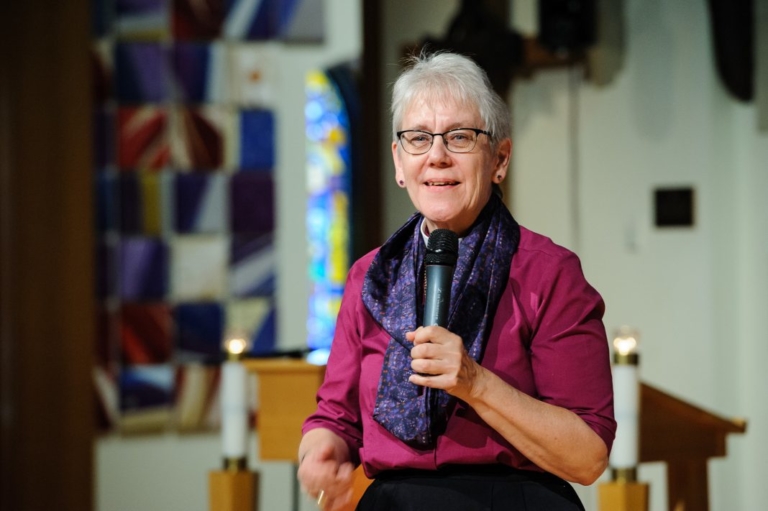I had no idea that a queer interfaith coalition existed until my state of blissful ignorance was by punctured by the article below. Apparently, it includes Muslims, which is odd, since countries in which Muslims have unfettered control enjoy throwing members of the alphabet community from the top of tall buildings.
So far, eighteen people from the Anglican Church of Canada, a bastion of inclusion in spite of having been deserted by those it purports to include, have signed the resolution. They include the Primate Linda Nicholls, Bishop Lynne McNaughton from the Diocese of Kootenay, and a further assortment of gentlemen and lady reverends, many of whom have come out as queer. Not that they have an axe to grind.
As of today, there are 182 signatories: the entire religious gay population of Canada. Not quite all are clergy. No Muslims have signed it; they probably all suffer from vertigo.
You can find the signatories here, in case you need a list of churches to avoid.
I didn’t dredge up the photo from a sleazy gay website, it accompanies the article.
Read it all here:
In celebration of June as Pride Month, I would like to share a resolution that unanimously passed on May 25 at the annual meeting of the Anglican Church of the Diocese of the Kootenays.
Resolution to Support the Queer Interfaith Coalition
The Queer Interfaith Coalition was formed in late 2023 in response to an increase in homophobic and anti-trans* rhetoric. The Queer Interfaith Coalition is a group of religious leaders and laypeople from Jewish, Muslim, Christian and other backgrounds. The QIC seeks to reclaim the word “religious” to mean a word of faith, of safety, of inclusion and especially of love. As well, they seek to acknowledge that every human being is born in the image of God and that God’s love has always been and will always be inclusive.
On the 14th of March, the Queer Interfaith Coalition launched an open letter to the Canadian government demanding action in response to the rise in homophobic and anti-trans rhetoric. In this open letter they write: “We affirm that the shared understanding of our religious duty is to dedicate ourselves to advocating for the full and comprehensive human rights of all members of the 2SLGBTQIA+ community; promoting mental health, realizing the rights of 2SLGBTQIA+ children and youth, and ending gender-based violence.”


 Archbishop Linda Nicholls, primate of the Anglican Church of Canada, has yet to decide on an exact retirement date, Council of General Synod (CoGS) heard Nov. 24.
Archbishop Linda Nicholls, primate of the Anglican Church of Canada, has yet to decide on an exact retirement date, Council of General Synod (CoGS) heard Nov. 24.
 In 2016 Canada gave the terminally ill the choice to be euthanised.
In 2016 Canada gave the terminally ill the choice to be euthanised. The Anglican churches in Nigeria, Uganda and Rwanda have effectively separated from the Anglican Communion by refusing to participate in the Lambeth Conference, says Archbishop Linda Nicholls, primate of the Anglican Church of Canada.
The Anglican churches in Nigeria, Uganda and Rwanda have effectively separated from the Anglican Communion by refusing to participate in the Lambeth Conference, says Archbishop Linda Nicholls, primate of the Anglican Church of Canada. Request the implementation of UN resolutions 242 (1967), 338 (1973), 194 (1948)
Request the implementation of UN resolutions 242 (1967), 338 (1973), 194 (1948) Last year, in the months before General Synod and the primatial election, an acquaintance told me that she had heard someone publicly share that I am racist. My initial response was to be deeply hurt and to try to find out what I had said or done that would lead to those remarks. How had I acted? What had I said? How could this be when I abhor the thought of racism?
Last year, in the months before General Synod and the primatial election, an acquaintance told me that she had heard someone publicly share that I am racist. My initial response was to be deeply hurt and to try to find out what I had said or done that would lead to those remarks. How had I acted? What had I said? How could this be when I abhor the thought of racism? We have a unique opportunity to witness within the Anglican Communion to what it means to live together in faith. In a world of increasing polarization where differences become reasons to hate, we are a Church that gathers first around our call in Jesus Christ. We have differences – language, culture, race, sexual orientation, liturgical preferences, theological preferences – and we could divide on any or all of these. Yet, our beloved Church seeks a unity in God built on respect, dignity of every person, and the humility grounded in our need for each other as we each seek to be faithful to the Gospel and need to hear how God is speaking to each of us and to the whole Church. Despite the sometimes pain of our differences – we are family in Christ.
We have a unique opportunity to witness within the Anglican Communion to what it means to live together in faith. In a world of increasing polarization where differences become reasons to hate, we are a Church that gathers first around our call in Jesus Christ. We have differences – language, culture, race, sexual orientation, liturgical preferences, theological preferences – and we could divide on any or all of these. Yet, our beloved Church seeks a unity in God built on respect, dignity of every person, and the humility grounded in our need for each other as we each seek to be faithful to the Gospel and need to hear how God is speaking to each of us and to the whole Church. Despite the sometimes pain of our differences – we are family in Christ.